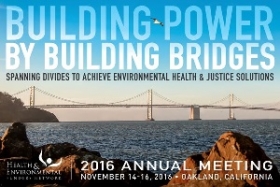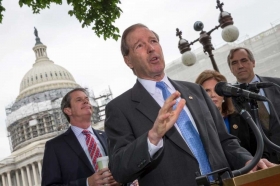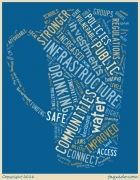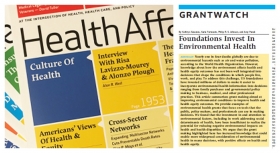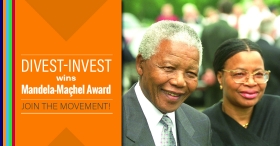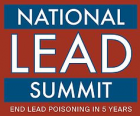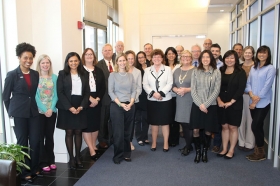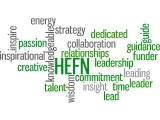You are here
HEFN's 2016 Year in Review

This post was authored by HEFN Director Kathy Sessions.
We’re pleased to share this review of HEFN’s work in 2016. It was a year of milestones and movements, of political tensions and strengthening alliances.
We are grateful for HEFN’s partners – its members, leaders, philanthropic and field colleagues – in our collective work to safeguard public health and environmental quality, and to advance racial, gender, and health equity in the process.
New Strategic Direction
In 2016 HEFN adopted a new direction. Pivoting around its new mission – of mobilizing philanthropy to accelerate solutions for environmental health and justice – HEFN launched several outcome-focused “innovation lab“ projects. We committed to ambitious goals for significantly expanding investments in environmental health and justice, including by increasing grants to grassroots organizing and to efforts led by people of color, women, low-income people, and young people.
Building Power for Environmental Health & Justice
Funders explored “Building Power by Building Bridges: Spanning Divides for Environmental Health and Justice Solutions” at the HEFN 2016 annual meeting. The November gathering in Oakland, California opened with a half-day focus on drinking water and then expanded to highlight dynamic speakers, from political scientists reflecting on the election, to a Google executive showcasing data-sharing efforts, to leaders from Black Lives Matter and the Standing Rock Sioux Council discussing movement-building.
The theme of “building power by building bridges” also was an apt frame for much of HEFN’s activities in 2016.
Milestone in Chemicals Policy Reform
In 2016, President Obama signed into law the Frank R. Lautenberg Chemical Safety for the 21st Century Act, reforming the Toxic Substances Control Act (TSCA) and establishing the first major new, non-energy-related environmental law in a generation. HEFN members have invested and collaborated to reform chemicals policy, markets, and design for over a decade, setting the context for this reform. The implementation of this law -- to improve the EPA’s ability to regulate toxic chemicals -- has already begun, and advocates are working hard to ensure it is as strong as possible.
In a new “Beyond TSCA” project, HEFN launched a retrospective evaluation of the multi-year investments in chemicals policy reform, as well as a forward-looking assessment of next generation strategies to protect people and wildlife from toxic exposures.
Emerging Focus on Drinking Water
The drinking water crisis in Flint, Michigan and related media attention were wake-up calls for many to challenges of drinking water safety, quantity, and access. HEFN partnered with multiple funder groups in hosting a series of learning webinars and funder conversations related to drinking water. Launching a new funder email group on drinking water, HEFN attracted and connected over 50 funder and funder group staff subscribers. Through funder surveys and interviews, HEFN explored and highlighted philanthropic interests in the issue. A half-day briefing that opened HEFN’s 2016 annual meeting focused on healthy drinking water for all.
Advancing Health, Equity, and Climate Co-Benefits
HEFN’s innovation lab project on climate, health, and equity elevated philanthropic attention to health and equity issues related to climate change. A new email group to enable communications quickly drew in over 60 funders and funder group staff. Staff and funders conducted numerous learning events and shared a funder briefing paper on “Achieving a Climate for Health: Philanthropy to Promote Health and Justice through the Challenges of Climate Change.” A fall 2016 webinar with health and climate cosponsors explored innovative approaches for identifying opportunities to benefit health, equity, and climate, such as in energy and air quality projects in low-income housing.
Deepening Knowledge
The peer-reviewed journal Health Affairs published an article co-authored by HEFN’s directors and two Steering Committee leaders on how and why “Foundations Invest in Environmental Health.”
HEFN hosted many funder calls and webinars on issues of high interest, engaging funders beyond its membership through jointly hosted events with other philanthropic partners, from an election-focused webinar series to discussions of pipeline activism, drinking water, fracking, toxics, children’s environmental health, and trade treaty implications for environmental health and justice.
GivingInSight, HEFN’s blog for and about funders focused on health and the environment, featured funder voices on topics like The Heinz Endowments’ president’s “Flint and Us” perspective, as well as HEFN staff posts like program Director Jeff Wise’s post about TSCA reform and summer intern Khalila Lomax’ post on water accessibility.
News and updates also were regularly shared on Facebook, Twitter, and LinkedIn.
Active Members Making Impact
In 2016, HEFN members invested and engaged other partners in ambitious efforts to make environmental conditions healthier for all.
Numerous members were among the 150 signatory foundations of Divest-Invest Philanthropy receiving the 2016 Nelson Mandela-Graça Machel Innovation Award for Brave Philanthropy from CIVICUS for their commitment to divest from fossil fuels and invest in climate solutions.
Several members co-sponsored a National Lead Summit in Washington, DC which has launched a 5-year campaign to end childhood lead poisoning. HEFN members accelerated investments in green chemistry, clean energy, healthy housing, and safer materials and products.
Members concerned about shale oil and gas development supported research on health and other impacts, as well as public interest advocacy and a pooled fund for grassroots response in impacted communities. They convened in Boston with New England foundations to consider grantmaking to support community groups’ opposition to fast-moving natural gas pipeline proposals throughout the region. And they gained new partners as the movement to protect communities, water, and climate from fossil fuel infrastructure expansion gained new attention with the Standing Rock Sioux resistance to the Dakota Access Pipeline.
In many communities in and outside the US, place-focused members invested in improved health through work on grassroots organizing and civic engagement, air quality and drinking water, housing and built environment, land use and economic development. Los Angeles’ new “Clean Up Green Up” rules to ease health hazards in polluted neighborhoods, for example, reflected several members’ efforts. Members partnered globally to defend health and equity interests related to trade negotiations, plastics pollution in oceans, European environmental health policy, and movement-building.
Championing Environmental Health and Environmental Justice
HEFN funder leaders were vocal champions in and beyond philanthropy for racial and gender equity, such as through this blog post by Groundswell Fund Director Vanessa Daniel.
Celebrating the 50th anniversary of the National Institute for Environmental Health Sciences, the National Institutes of Health honored 12 environmental health research champions including long-time HEFN participant Pete Myers. And many other grantees and colleagues of HEFN members were honored with prizes in 2016. On the blog, we shared news of the Cornell Douglas Foundation’s Jean and Leslie Douglas Pearl Awards and of other major awards to “Champions in the Spotlight.”
New Members and Leaders
HEFN enthusiastically welcomed the CS Fund, Energy Foundation, Pisces Foundation, William Penn Foundation, and Singing Field Foundation into its active community of foundation and donor members.
Kat Gilje of the Ceres Trust and Shorey Myers of the Jenifer Altman Foundation joined HEFN’s Steering Committee which helped guide the network and provided leadership for programs, operations, and outreach.
Field Engagement and Service
To sustain and expand relationships among grantmaking communities, HEFN staff attended numerous philanthropic events in 2016, including several meetings of national or regional grantmaker groups and the 2016 convening of the Forum of Regional Associations of Grantmakers for discussion of the launch of an expanded Forum to include more philanthropy-supporting groups.
Staff represented HEFN’s interests and joined efforts to strengthen the environmental health field through the National Environmental Health Partnership Council.HEFN staff made presentations at events including for the National Association of City and County Health Officials (NACHHO) and for the National Council on Science and the Environment. They provided more than 20 “office hours” consultations in 2016, offering strategic, development, and/or organizational advice to grantmakers, nonprofits, other funder groups, and government officials.
Thanks to NASA/M. Justin Wilkinson, Texas State University, Jacobs Contract at NASA-JSCfor the stunning photograph of a fiery 2016 sunset over the South Atlantic, taken from the International Space Station.
From our Blog
Upcoming Events
|
Apr 23 2024 Zoom |
Apr 30 2024 Zoom |


